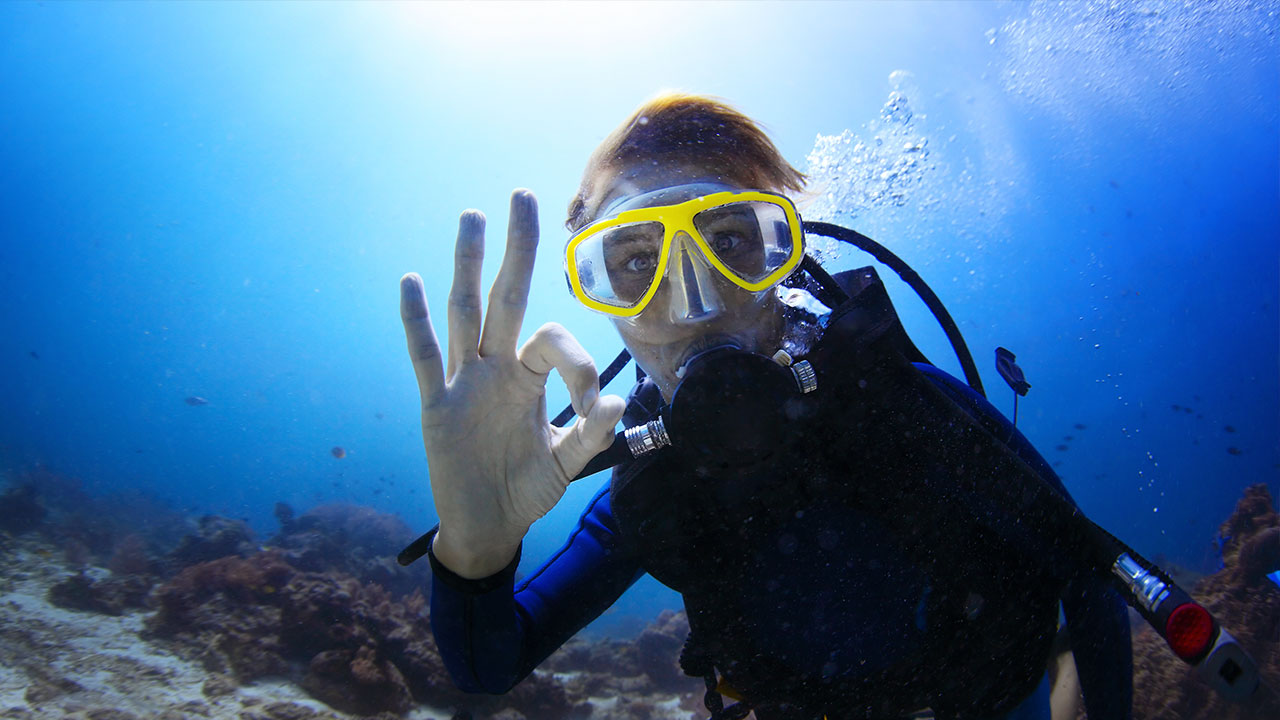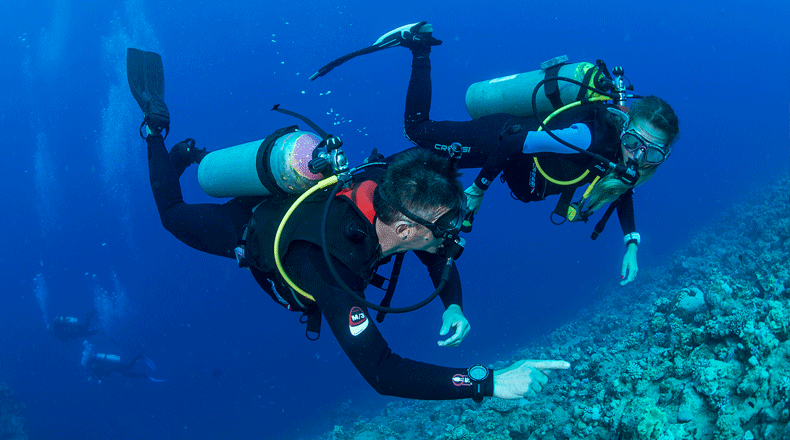Panic Underwater: Why Does It Happen And How to Deal With It

Various surveys indicate that more than half of all divers have experienced at least one panic or near-panic episode. If you are among those divers, you must know that it can take only a minute to go from cool as a cucumber to an out-of-control condition. Being in a state of panic usually causes divers to behave irrationally and can lead to some dangerous or even fatal incidents. However, all of this is avoidable if the affected diver uses their common sense and follows their basic dive training.
Anxiety is a normal human emotion that we all experience under threatening or difficult situations. In fact, fear can make us more alert, thus helping to deal with threats or dangers. A more intense form of anxiety is distress or panic, i.e. a sudden powerful surge of fear with an obsessive focus on it. Panic attacks are reinforced by our body’s physical response to the thought or experience that makes us anxious and fearful.
Diving stress, that leads to panic, can be divided into two categories: physical and psychological. Physical stress may be caused by a poorly fitting wetsuit, uncomfortable equipment, hypothermia, overexertion, leaking mask, free flow regulator, losing a piece of diving equipment, etc. Some examples of the psychological stress are lack of confidence in your own ability, your buddy’s ability, your equipment or your surface support, fear of the unknown, peer pressure and others. Physical stress can lead to psychological and vice versa.
Common Issues That May Lead to Panic
The first step towards dealing with panic is to understand what can cause it and develop emergency plans. Listed below are some issues and conditions that may lead to panic underwater.
Diving Conditions
- Separation from a dive buddy
- Poor visibility
- Rough seas
- Night dives with a lack of adequate training or/and preparation
- Deep and cold dives
- Dangerous marine life
- Entanglement
- Limited overhead dive environment (ice dives, caves, wreck penetration)
Scuba Equipment Problems
- Loss of mask or other equipment
- Malfunctioning dive light
- Buoyancy problems
- Uncontrolled ascent
- Broken or poorly fit equipment
Stuff happens, but if you are prepared for it, rational fear is far less likely to become irrational panic. Develop an emergency procedure for every situation that might send you over the edge. Rehearse these procedures with your dive buddy, so that you both know how to act in case of any emergency.
Pre-Dive Stress Check
Performing a pre-dive stress check is a good habit that you should always practice just as you do an equipment check before every dive. If you feel anxious or something about the dive worries you on the surface, it is likely that things will get only worse underwater. Ask yourself, if you are eager to make the dive at hand. Answer this question honestly, since if you are overly stressed about something, yet decide to proceed with the dive, you may be putting yourself at risk. Discuss the issue that worries you with your buddy or someone in charge of the event. If you are unable to resolve it, don’t go into the water.
If you notice that your dive buddy seems distracted, disorganized, unusually chatty, too quiet or displays some other odd behavior, such as repeatedly assembling and disassembling his/her equipment, it may be a sign that this person is not comfortable about making the dive. Talk to your buddy and/or the person in charge to try and clear the situation up. If you discover that your buddy is under stress, advise him/her to skip the dive and ask for a new dive buddy, if possible.
What to Do When Panic Strikes?
First of all, in case you find yourself in a physically or psychologically stressful situation, you need to listen to your own feelings. Being aware of your condition will help you stop the fear from reaching a critical point. Some common symptoms of and leading to panic include: chest tightness, fear of the unknown, sense of lost control, fear of dying, hyperventilation, muscle fatigue and so on. How do we stop these symptoms and feelings from intensifying?
The simple instruction for dealing with panic is Stop-Breathe-Think-Act. Stop your current fearful thought, don’t do any frantic movements. Employ deep, belly breathing. Remind yourself of your surroundings and skills as a diver. Make the best decision based on your experience and knowledge. Act calmly to remove the source of stress. If you're out of air or have trouble breathing, the other steps still apply.
Helping a Panicking Buddy
If you notice that your diving associate is struggling for buoyancy, air or having difficulty managing him/herself, it is important that you know how to help reduce the level of stress and bring your buddy back from the brink of panic.
- Put one hand on their shoulder.
- Establish good eye contact.
- Signal for them to stop and breathe deeply.
Often, a reassuring squeeze of the hand that lets your buddy know you’re there for them is enough to calm them down.
In case if the situation is more serious and you see that your dive buddy is already panicking, has removed some of his/her equipment, is rapidly ascending or descending or is clearly unable to function well underwater, you need to approach this individual with special caution, as there is no way to tell what their mental state may be, nor how they will react. Any intervention represents some risks, therefore, before deciding on your actions you need to carefully asses the situation, your training level, and physical ability.
If you want to learn how to prevent accidents and respond to in water emergencies, take our Rescue Diver course.
Always be aware of your own feelings and state of mind, if you do not feel comfortable before a dive, do not be embarrassed to cancel. Don’t get discouraged in case you do experience some anxiety while diving. Remember, if you can keep your wits and remain calm, you will find a way out of almost any situation.





Why is there no author’s name to credit with this good information?